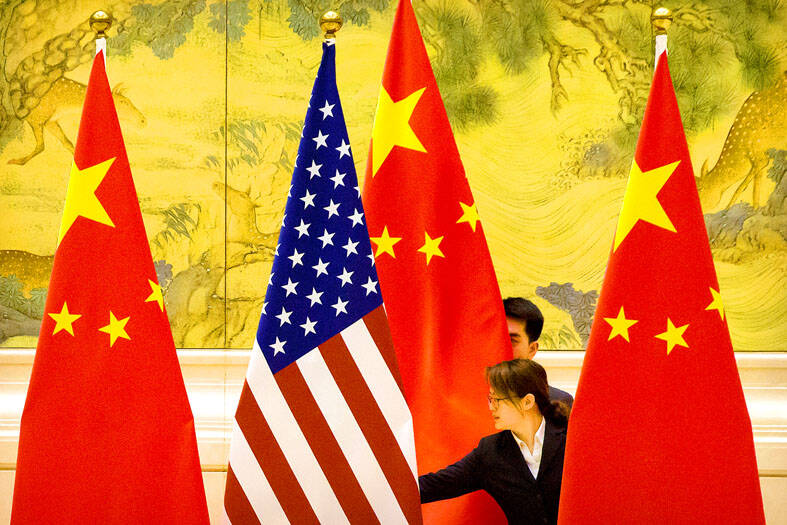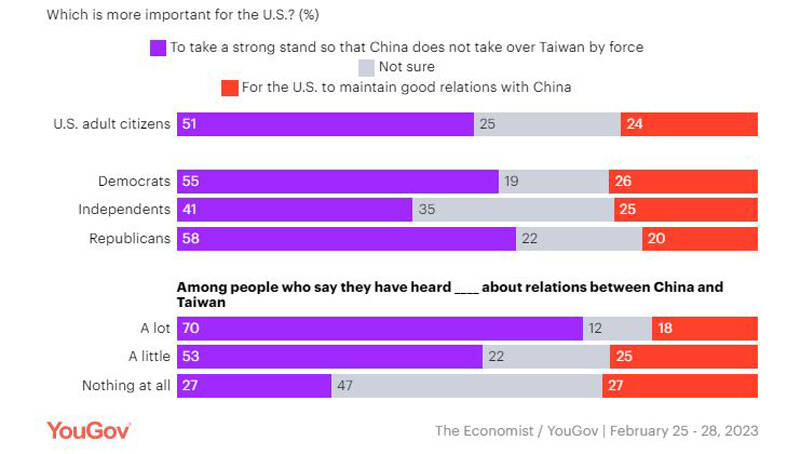More than half of US respondents in a poll considered protecting Taiwan more important than maintaining good relations with China, a survey conducted by The Economist and YouGov showed.
The poll conducted from Feb. 25 to Tuesday last week asked 1,500 adult US citizens questions about the US’ role amid rising tensions between Taiwan and China.
Fifty-one percent of the respondents said it is more important for the US “to take a strong stand so that China does not take over Taiwan by force,” while 24 percent preferred “the US to maintain good relations with China.”

Photo: AP
Among people who said they have heard “a lot” about relations between Taiwan and China, 70 percent said that the US should take a strong stand, while 18 percent supported maintaining good relations with Beijing.
If an armed conflict were to arise between Taiwan and China, 37 percent of respondents said that the “US should help protect Taiwan with military force,” while 22 percent disagreed.
However, 41 percent of respondents said that they “do not know enough about the topic to say.”

Photo: Screen grab from the YouGov Web site
Among people who said they are familiar with the cross-strait situation, 63 percent said the US should help protect Taiwan using military force, while 25 percent disagreed.
Asked about the US’ relations with China, 40 percent of respondents viewed China as an enemy and 35 percent said that China is unfriendly to the US. Only 4 percent considered Beijing an ally, while 9 percent said it is friendly toward the US.
The opposite was found regarding the US’ relations with Taiwan, with 24 percent of respondents saying Taiwan is an ally of the US, and 37 percent considering the nation friendly. Only 3 percent said Taipei is an enemy of the US, while 8 percent said it is unfriendly.
Regarding US House of Representatives Speaker Kevin McCarthy’s rumored plan to visit Taiwan, 48 percent of respondents said that McCarthy should visit, while 25 percent said he should not.
In a poll conducted after then-US House of Representatives speaker Nancy Pelosi’s visit to Taiwan in August last year, 39 percent of respondents disapproved of the trip, while 34 percent approved.
The survey had a margin of error of about 3 percent, YouGov’s Web site says.

A magnitude 5.6 earthquake struck off the coast of Yilan County at 12:37pm today, with clear shaking felt across much of northern Taiwan. There were no immediate reports of damage. The epicenter of the quake was 16.9km east-southeast of Yilan County Hall offshore at a depth of 66.8km, Central Weather Administration (CWA) data showed. The maximum intensity registered at a 4 in Yilan County’s Nanao Township (南澳) on Taiwan’s seven-tier scale. Other parts of Yilan, as well as certain areas of Hualien County, Taipei, New Taipei City, Taoyuan, Hsinchu County, Taichung and Miaoli County, recorded intensities of 3. Residents of Yilan County and Taipei received

TRUST: The KMT said it respected the US’ timing and considerations, and hoped it would continue to honor its commitments to helping Taiwan bolster its defenses and deterrence US President Donald Trump is delaying a multibillion-dollar arms sale to Taiwan to ensure his visit to Beijing is successful, a New York Times report said. The weapons sales package has stalled in the US Department of State, the report said, citing US officials it did not identify. The White House has told agencies not to push forward ahead of Trump’s meeting with Chinese President Xi Jinping (習近平), it said. The two last month held a phone call to discuss trade and geopolitical flashpoints ahead of the summit. Xi raised the Taiwan issue and urged the US to handle arms sales to

Taiwan has secured another breakthrough in fruit exports, with jujubes, dragon fruit and lychees approved for shipment to the EU, the Ministry of Agriculture said yesterday. The Animal and Plant Health Inspection Agency on Thursday received formal notification of the approval from the EU, the ministry said, adding that the decision was expected to expand Taiwanese fruit producers’ access to high-end European markets. Taiwan exported 126 tonnes of lychees last year, valued at US$1.48 million, with Japan accounting for 102 tonnes. Other export destinations included New Zealand, Hong Kong, the US and Australia, ministry data showed. Jujube exports totaled 103 tonnes, valued at

BIG SPENDERS: Foreign investors bought the most Taiwan equities since 2005, signaling confidence that an AI boom would continue to benefit chipmakers Taiwan Semiconductor Manufacturing Co’s (TSMC, 台積電) market capitalization swelled to US$2 trillion for the first time following a 4.25 percent rally in its American depositary receipts (ADR) overnight, putting the world’s biggest contract chipmaker sixth on the list of the world’s biggest companies by market capitalization, just behind Amazon.com Inc. The site CompaniesMarketcap.com ranked TSMC ahead of Saudi Aramco and Meta Platforms Inc. The Taiwanese company’s ADRs on Tuesday surged to US$385.75 on the New York Stock Exchange, as strong demand for artificial intelligence (AI) applications led to chip supply constraints and boost revenue growth to record-breaking levels. Each TSMC ADR represents